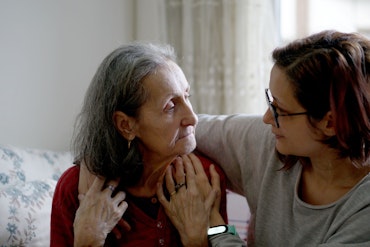Tasmanian palliative care education to end unless state government steps in
With its one-off assistance package from Federal Government running out, Tasmania’s peak palliative care body is seeking funding from the state government or after 20 years of operation, the organisation faces closure.

Tasmania’s peak palliative care body is seeking funding from the state government to continue its eductation programs (Source: Shutterstock)
In June 2012, Palliative Care Tasmania (PCT) received funding to increase its activities and deliver a range of programs such as educating service providers, carers, volunteers and the community about hospice, palliative care and best practice standards.
Since then, PCT has worked with hundreds of organisations and community groups across Tasmania, including aged care facilities, Council of the Ageing (COTA) and Aged and Community Services Australia (ACSA).
“We have been able to promote free education to the general community, and to staff and volunteers for organisations who wouldn’t normally have had the capacity for extra training,” says PCT general manager Colleen Johnstone.
She says PCT has been completely overwhelmed by how much the community wants this sort of information, particularly older people. “They want control over how they die, information about advanced care directives and the difference between life and non-life providing treatment,” she says.
The Gratton Institute Dying Well report 2014 highlights 70 per cent of Australians want to die at home, but the national average for people dying at home is about 14 per cent; in Tasmania, that figure has risen to 30 percent over the past few years.
“People are getting the death they want, with family, pets around and in their own bedroom,” she says. “More people in an acute setting are able to be at home for a longer period of time too.”
Ms Johnstone also points out some economic benefits to government with one US study finding savings of between USD$1500 to $60,000 when a person dies at home rather than in hospital.
A spokeswoman for the Federal Department of Health confirms The Better Access to Palliative Care (BAPC) program provided $49.2 million over four years to strengthen palliative care services in Tasmania but it was always a one off assistance package. The funding was directed towards District Nurses (TDN) of Tasmania, Palliative Care Tasmania (PCT), the Tasmanian Department of Health and Human Services (DHHS) and Australian Healthcare Associates (AHA).
Ms Johnstone acknowledges the funding was a one-off, but thought because their program was so successful, funding would be found and it would be allowed to continue. “We smashed our KPIs” she says. “It’s not a good return on investment to just let it fold. The only thing that impacts every person is death, and it is the least funded in the entire health portfolio.”
COTA Chief Executive Officer Sue Leitch Cota says it is really disappointing funding the service has not reconsidered. “It was a very valuable service in getting the message and conversation about end of life,” she says. “The worst situation is the family don’t know what a person’s wishes were, what funeral arrangements they wanted, and whether they wanted to die at home because those conversations didn’t happen.”
She highlights while PCT may be reducing its programs, palliative care services and clinical support have not been affected and people should contact their GP for more information.
Darren Mathewson, ACSA Divisional CEO – Tas/Vic says it would be very disappointing to see PCT close its doors and believes there is still time for either or both the State and Federal Government to commit resources to PCT to continue their important work with communities and service providers in Tasmania.
He believes the community engagement and education that PCT helped enable will be incredibly difficult to replicate.
“I’d be concerned that if they were to close, this gap in service would remain unfilled,” says Mr Mathewson. “PCT has helped educate thousands of Tasmanians over the last few years and as such, palliative care in Tasmania is currently at a very high standard, both nationally and internationally,”
Over the past few months, PCT has reduced its staff and services from employing the equivalent of up to nine full time staff across its Launceston, Hobart and Devonport operations, to one member of staff for a day a week in Hobart. The funding will run out in June 2017.
Ms Johnstone says talks are being held with the State Government, and the minister is supportive, but until the budget is approved, she feels the organisation is in limbo.























